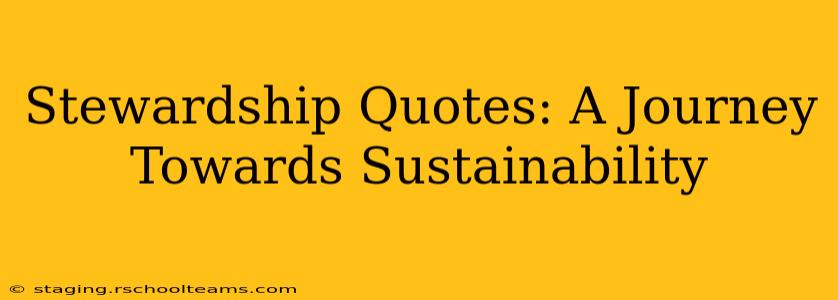Stewardship, the responsible and ethical management of resources entrusted to our care, has become increasingly crucial in our era of environmental challenges. From the vast expanse of our oceans to the intricate web of life in our forests, we are called to act as custodians of our planet. This exploration delves into the wisdom of stewardship quotes, examining their profound implications for our individual and collective journey towards a sustainable future. We'll unpack the meaning behind these powerful statements and explore how we can translate them into tangible actions in our daily lives.
What Does Stewardship Mean?
Before we delve into the quotes, let's establish a clear understanding of stewardship. Stewardship is more than just environmentalism; it's a philosophy encompassing responsibility for all that we've been entrusted with – natural resources, human communities, and even our own well-being. It's about recognizing our interconnectedness with the world and acting accordingly, with foresight and care for future generations. It's about making conscious choices that minimize our impact and maximize the benefits for all stakeholders.
Powerful Stewardship Quotes and Their Meaning
Many influential thinkers, activists, and spiritual leaders have articulated the importance of stewardship through insightful quotes. Let's explore some of them:
"The Earth provides enough to satisfy every man's needs but not every man's greed." - Mahatma Gandhi
This quote highlights the core issue of unsustainable practices: our insatiable desire often outweighs our planet's capacity to provide. Gandhi's words call us to examine our consumption patterns and prioritize needs over wants, fostering a more equitable and sustainable distribution of resources.
"We do not inherit the Earth from our ancestors; we borrow it from our children." - Native American Proverb
This powerful proverb emphasizes the intergenerational aspect of stewardship. We are temporary custodians, responsible for preserving the planet's health and resources for those who will inherit it after us. It's a compelling reminder that our actions today have long-lasting consequences.
"The greatest threat to our planet is the belief that someone else will save it." - Robert Swan
Swan's statement underscores the individual responsibility inherent in stewardship. We cannot passively wait for others to address environmental issues; we must each take proactive steps, however small, to contribute to positive change. Collective action arises from individual commitment.
How Can We Practice Stewardship in Our Daily Lives?
The wisdom embedded in these quotes translates into actionable steps in our daily lives:
-
Reduce, reuse, recycle: This simple mantra is a cornerstone of sustainable living. By minimizing waste, reusing items whenever possible, and diligently recycling, we actively participate in resource conservation.
-
Conserve water and energy: Simple changes like shorter showers, turning off lights when leaving a room, and opting for energy-efficient appliances significantly reduce our environmental footprint.
-
Support sustainable businesses: Choosing businesses that prioritize ethical and environmentally responsible practices with their supply chains reinforces a market demand for sustainability.
-
Advocate for change: Use your voice to support policies and initiatives that promote environmental protection and sustainable practices. Engage in respectful dialogue to influence change in your community.
-
Educate yourself and others: Continuously learn about environmental issues and share your knowledge with others to foster a greater awareness and understanding of stewardship's importance.
What are the Benefits of Stewardship?
Practicing stewardship offers numerous benefits beyond environmental preservation:
-
Improved public health: Reduced pollution and access to clean resources lead to better health outcomes.
-
Economic opportunities: Investing in sustainable practices often creates new jobs and economic opportunities.
-
Enhanced biodiversity: Protecting ecosystems and habitats safeguards the planet's incredible biodiversity.
-
Increased social equity: Sustainable practices often promote fairness and equity in resource access and distribution.
-
Greater community resilience: Sustainable communities are better equipped to withstand environmental shocks and stresses.
Conclusion: Embracing Our Role as Stewards
Stewardship is not merely an environmental concept; it's a fundamental ethical imperative. The quotes discussed above serve as powerful reminders of our responsibility to care for the planet and its resources. By embracing our role as stewards, we embark on a collective journey towards a more sustainable and equitable future for all. Let's translate the wisdom of these words into actions, fostering a world where both humanity and nature can thrive.
